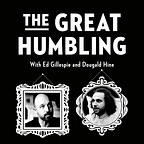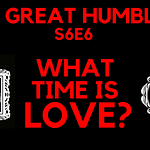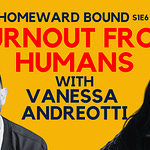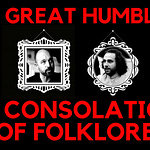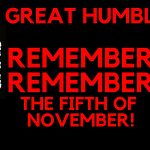We reach the end of Season 4 of The Great Humbling, though Ed and Dougald start the show with an invitation to a one-off live recording of a special episode with guests Rupert Read and Charlotte Du Cann for those who can join us in Norwich on 20 February.
As always, we start off by talking about what we've been reading, listening to, watching, imbibing, or otherwise taking on board in ways that get us thinking.
Ed has been reading a book called At Work in the Ruins by someone called Dougald Hine.
He's also working his way through Susan Cooper's classic series of fantasy novels, The Dark Is Rising. And he recently rewatched Roy Andersson's black comedy, Songs from the Second Floor.
Dougald talks about Gabor Maté's new book, The Myth of Normal: Trauma, Illness & Healing in a Toxic Culture which connects to many of the themes we've talked about in earlier episodes, not least in relation to Vanessa Machado de Oliveira's Hospicing Modernity.
Then we come to the book that prompted this episode, George Monbiot's Regenesis. If you've not read the book itself yet, we recommend at least reading George's initial Guardian article in which he introduced his argument about the end of agriculture, ‘Lab-grown food will soon destroy farming – and save the planet’.
Ed mentions Chris Smaje's Small Farm Future for a rather different picture of the future of agriculture.
For direct responses to Regenesis, we also recommend:
– this critique by Chris Smaje;
– Simon Fairlie’s review of Regenesis in The Land magazine;
– Gunnar Rundgren’s ‘In defence of farming’;
– the investigation by Jonathan Matthews at GM Watch which details the origins and connections of RePlanet, the organisation with whom Monbiot is collaborating on the Reboot Food campaign;
– this Twitter thread from Rob Percival (head of food policy at the Soil Association and author of The Meat Paradox, Radio 4’s current Book of the Week) on the basic questions about animal farming and climate change.
Dougald talks about Iain McGilchrist's The Master and His Emissary and the different worlds constructed and inhabited by the different hemispheres of the brain.
We discuss the ETC group report, 'Who Will Feed Us?', on how the world is fed today and how we navigate a climate-changed future, with its startling figure that 70% of the food humanity eats currently comes from the 'peasant food web' rather than the 'industrial food chain'. An analysis by A Growing Culture reveals the problems with more recent peer-reviewed papers which claimed to have debunked this figure. (You'll find the links to the papers themselves via the Growing Culture link.)
Ed talks about Michael O'Callaghan's reflections on AI and critical thinking, then reads a ChatGPT pastiche of a Dr Seuss poem. This brings out Dougald's inner Nick Cave.
We close with some thoughts from Marisol de la Cadena and Mario Blaser's introduction to A World of Many Worlds.

